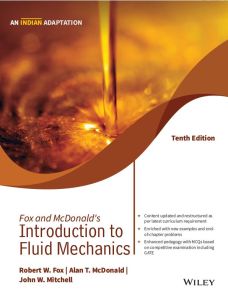Fox and McDonald's Introduction to Fluid Mechanics, 10ed, (An Indian Adaptation)
ISBN: 9789354641077
640 pages
Publication Year: 2021
For more information write to us at: acadmktg@wiley.com

Description
The Indian Adaptation of Fox and McDonald's Introduction to Fluid Mechanics, tenth edition
comes with revised and enriched content, organized as per Indian curriculum requirements.
The new concepts covered include The Orifice Meter, The Mouthpiece, and Free Jet Flow, Draft
Tube, Trapezoidal Weir, Stepped Notch, Cippoletti Weir, Proportional Weir, and more. The book
incorporates numerous pedagogical features that aid, reinforce and evaluate learning, and
consistent problem-solving methodology that equips students to apply fluid mechanics
principles to the design of devices and systems.
Preface to the Adapted Edition
Preface
Chapter 1 Introduction
1.1 Introduction to Fluid Mechanics
1.2 Basic Equations
1.3 Methods of Analysis
1.4 Dimensions and Units
1.5 Analysis of Experimental Error
1.6 Summary
Chapter 2 Fundamental Concepts
2.1 Fluid as a Continuum
2.2 Velocity Field
2.3 Stress Field
2.4 Viscosity
2.5 Surface Tension
2.6 Description and Classification of Fluid Motions
2.7 Summary and Useful Equations
Chapter 3 Fluid Statics
3.1 The Basic Equation of Fluid Statics
3.2 The Standard Atmosphere
3.3 Pressure Variation in a Static Fluid
3.4 Hydrostatic Force on Submerged Surfaces
3.5 Buoyancy and Stability
3.6 Fluids in Rigid-Body Motion
3.7 Summary and Useful Equations
Chapter 4 Basic Equations in Integral Form for a Control Volume
4.1 Basic Laws for a System
4.2 Relation of System Derivatives to the Control Volume Formulation
4.3 Conservation of Mass
4.4 Momentum Equation for Inertial Control Volume
4.5 Momentum Equation for Control Volume with Rectilinear Acceleration
4.6 Momentum Equation for Control Volume with Arbitrary Acceleration
4.7 The Angular-Momentum Principle
4.8 The First and Second Laws of Thermodynamics
4.9 Summary and Useful Equations
Chapter 5 Introduction to Differential Analysis of Fluid Motion
5.1 Conservation of Mass
5.2 Stream Function for Two-Dimensional Incompressible Flow
5.3 Motion of a Fluid Particle (Kinematics)
5.4 Momentum Equation
5.5 Summary and Useful Equations
Chapter 6 Incompressible Inviscid Flow
6.1 Momentum Equation for Frictionless Flow: Euler’s Equation
6.2 Bernoulli Equation: Integration of Euler’s Equation Along a Streamline for
Steady Flow
6.3 The Bernoulli Equation Interpreted as an Energy Equation
6.4 Energy Grade Line and Hydraulic Grade Line
6.5 Unsteady Bernoulli Equation: Integration of Euler’s Equation Along a Streamline
6.6 Irrotational Flow
6.7 Summary and Useful Equations
Chapter 7 Dimensional Analysis and Similitude
7.1 Nondimensionalizing the Basic Differential Equations
7.2 Buckingham Pi Theorem
7.3 Significant Dimensionless Groups in Fluid Mechanics
7.4 Flow Similarity and Model Studies
7.5 Summary and Useful Equations
Chapter 8 Internal Incompressible Viscous Flow
8.1 Internal Flow Characteristics
PART A Fully Developed Laminar Flow
8.2 Fully Developed Laminar Flow between Infinite Parallel Plates
8.3 Fully Developed Laminar Flow in a Pipe
PART B Flow in Pipes and Ducts
8.4 Shear Stress Distribution in Fully Developed Pipe Flow
8.5 Turbulent Velocity Profiles in Fully Developed Pipe Flow
8.6 Energy Considerations in Pipe Flow
8.7 Calculation of Head Loss
8.8 Solution of Pipe Flow Problems
PART C Flow Measurement
8.9 Flow Measurement and Flow Restriction
8.10 Restriction Flow Meters for Internal Flows
8.11 Summary and Useful Equations
Chapter 9 External Incompressible Viscous Flow
PART A Boundary Layers
9.1 The Boundary Layer Concept
9.2 Laminar Flat Plate Boundary Layer: Exact Solution
9.3 Momentum Integral Equation
9.4 Use of the Momentum Integral Equation for Flow with Zero Pressure Gradient
9.5 Pressure Gradients in Boundary Layer Flow
PART B Fluid Flow About Immersed Bodies
9.6 Drag
9.7 Lift
9.8 Summary and Useful Equations
Chapter 10 Fluid Machinery
10.1 Introduction and Classification of Fluid Machines
10.2 Turbomachinery Analysis
10.3 Pumps, Fans, and Blowers
10.4 Positive Displacement Pumps
10.5 Hydraulic Turbines
10.6 Propellers and Wind Turbines
10.7 Compressible Flow Turbomachines
10.8 Summary and Useful Equations
Chapter 11 Flow in Open Channels
11.1 Basic Concepts and Definitions
11.2 Energy Equation for Open-Channel Flows
11.3 Localized Effect of Area Change (Frictionless Flow)
11.4 The Hydraulic Jump
11.5 Steady Uniform Flow
11.6 Flow with Gradually Varying Depth
11.7 Discharge Measurement Using Weirs
11.8 Summary and Useful Equations
Chapter 12 Introduction to Compressible Flow
12.1 Review of Thermodynamics
12.2 Propagation of Sound Waves
12.3 Reference State: Local Isentropic Stagnation Properties
12.4 Critical Conditions
12.5 Basic Equations for One-Dimensional Compressible Flow
12.6 Isentropic Flow of an Ideal Gas: Area Variation
12.7 Normal Shocks
12.8 Supersonic Channel Flow with Shocks
12.9 Summary and Useful Equations
Appendix A Fluid Property Data A-1
A.1 Specific Gravity
A.2 Surface Tension
A.3 The Physical Nature of Viscosity
A.4 Lubricating Oils
A.5 Properties of Common Gases, Air, and Water
Appendix B Selected Performance Curves for Pumps and Fans
B.1 Introduction
B.2 Pump Selection
B.3 Fan Selection
Appendix C Flow Functions for Computation of Compressible Flow
C.1 Isentropic Flow
C.2 Normal Shock
Appendix D Analysis of Experimental Uncertainty
D.1 Introduction
D.2 Types of Error
D.3 Estimation of Uncertainty
D.4 Applications to Data
D.5 Summary
References
Appendix E Introduction to Computational Fluid Dynamics
E.1 Introduction to Computational Fluid Dynamics
E.2 Finite Difference Approach to CFD
Index

